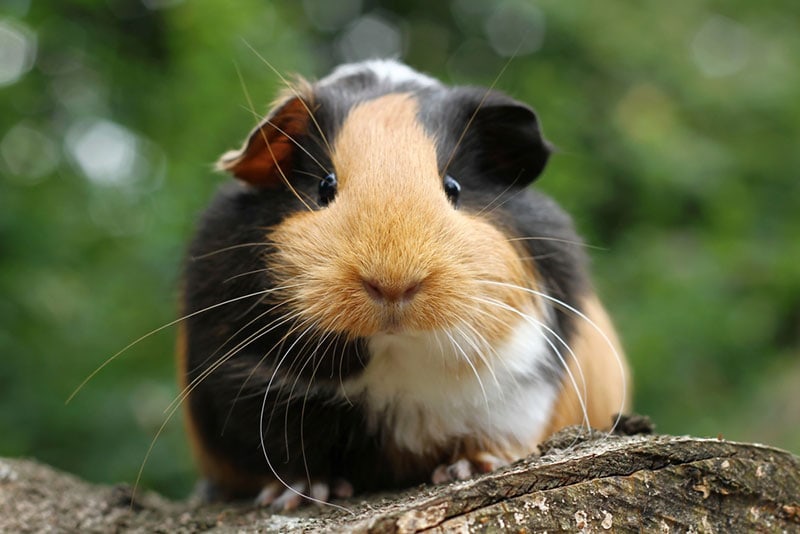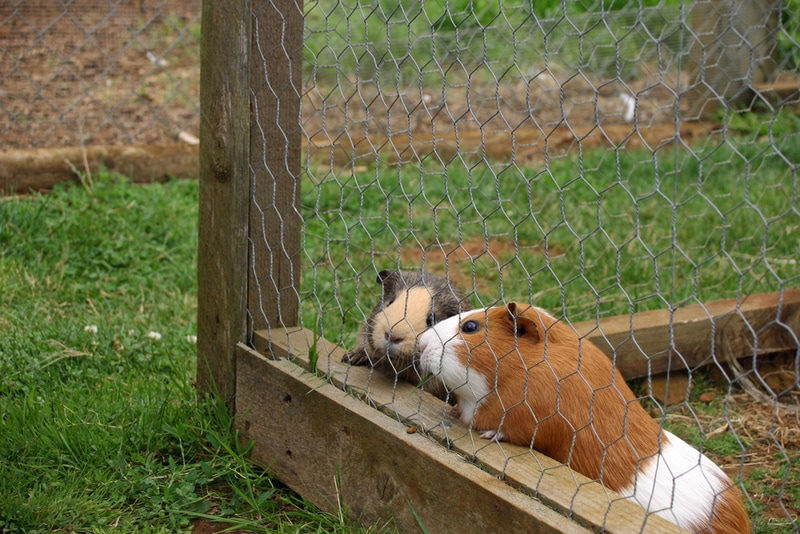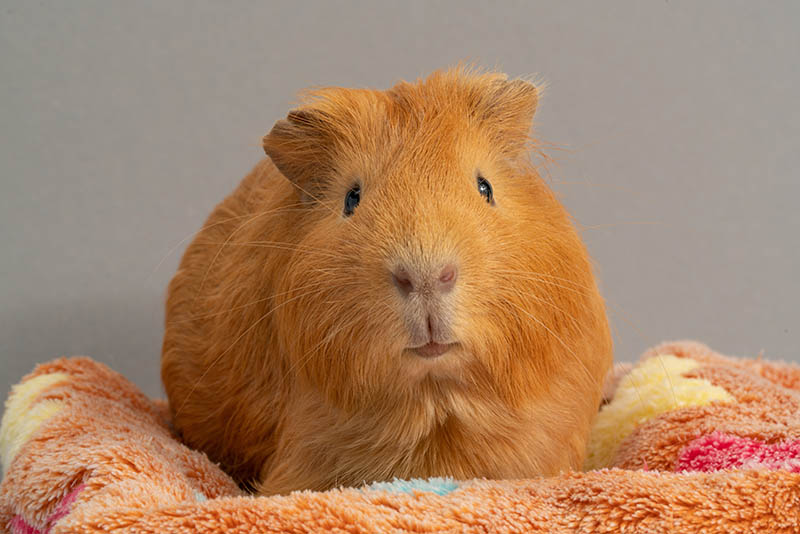Can Guinea Pigs Eat Chicken? Vet-Reviewed Nutrition Facts
By Jordyn Alger
Updated on
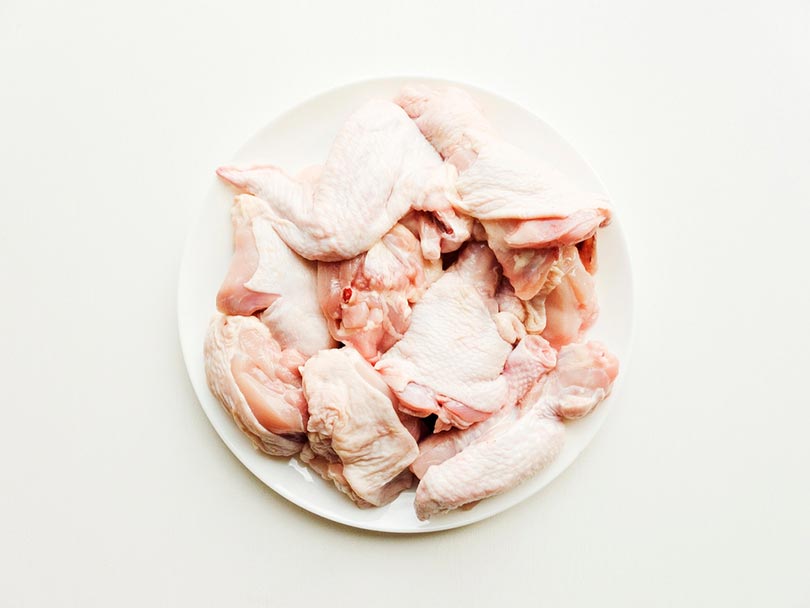
Finding new treats for your guinea pig can be fun, but if your pet is picky, it can be quite the challenge! You may feel like you’ve exhausted all options among fruits, veggies, and seeds, and now you’re considering other foods.
If you’re cooking chicken and toying with the idea of feeding a piece to your guinea pig, stop and read this first: chicken is not safe for your guinea pig and should not be fed to them in any circumstances. To learn why chicken is unsafe for your guinea pig, keep reading below.
Why Can’t Guinea Pigs Eat Chicken?
The reason that guinea pigs cannot eat chicken is simple: guinea pigs are herbivores. They are strict herbivores who should never consume meat, as their digestive systems aren’t built to handle animal proteins. Chicken and any other form of meat should be kept away from your guinea pig, or else they can experience serious health consequences.
Other foods that you should keep away from your guinea pig include:
- High-starch foods (peas, beans, corn, etc.)
- Nuts, seeds, and dried fruits
- Pellets designed for other animals
Foods that should be given only sparingly are the following:
- Cruciferous vegetables (cabbage, collards, Bok choy, broccoli, etc.)
- High oxalate greens (kale, chards, collards, spinach, etc.)

Providing a Healthy Diet for Your Guinea Pig
The most important part of your guinea pig’s diet is hay, so ensure your pet has 24/7 access to quality grass hays. Some of the most popular grass hays are Timothy and orchard grass hays, but you can also use oat, meadow, or brome hay. Without constant access to grass hay, your guinea pig will be at risk of dental issues and gastrointestinal conditions.
Vegetables
The second most important part of your guinea pig’s diet is vegetables. Familiarize your pet with vegetables slowly, as feeding them too quickly after the first introduction can cause digestive problems.
Once your guinea pig is adjusted to a certain veggie, you can feed them around ½–1 cup daily. Ideally, you should feed your guinea pig two to three types of veggies each day.
Pellets
Pellets can be fed to your pet, but only in moderate amounts. 1–2 tablespoons each day is what you should aim for. You can also feed fruits and other treats once or twice per week. Feeding them to your pet in excess may lead to obesity or other health issues, so offer them sparingly.
Vitamin C
A vital part of any guinea pig’s diet is vitamin C. Providing vitamin C through their meals is essential for their health, as they cannot synthesize their own vitamin C – a trait they share with a small number of animal species, including a few birds, some bats, and humans. Without a good source of vitamin C in their diets, guinea pigs become susceptible to conditions such as scurvy. Leafy greens, bell peppers, and spinach contain vitamin C and can be served to your guinea pig.
However, it is not recommended that you add vitamin C to your guinea pig’s water, as it tends to deteriorate rapidly and deter your guinea pig from drinking their water. Always provide fresh, clean water for your guinea pig.
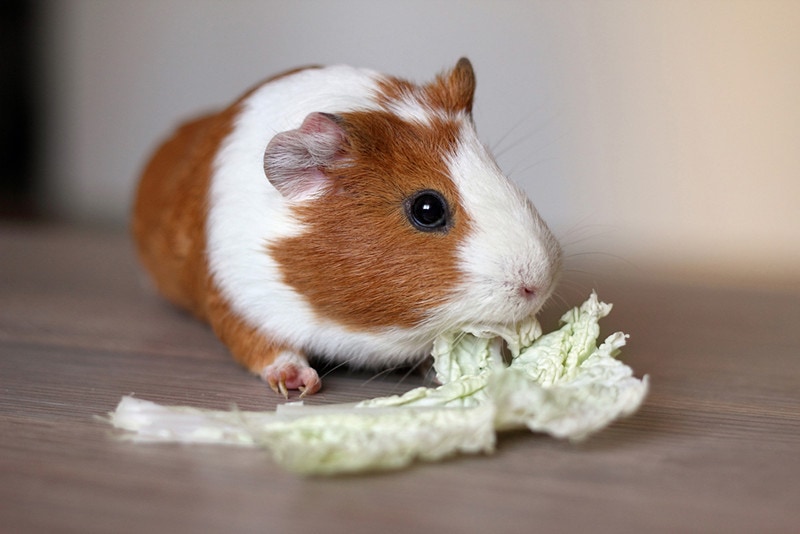
Why a Proper Diet Is Essential to Your Guinea Pig’s Health
A guinea pig’s diet is a crucial part of their well-being. Providing high-quality food in appropriate proportions will give your guinea pig a good foundation of health, making it easier to fight off illnesses. Without a proper diet, your guinea pig may develop issues such as gastrointestinal diseases, dental conditions, and scurvy.
Gastrointestinal Diseases
Guinea pigs have sensitive digestive tracts. If they eat something that disagrees with them, the balance of “good” and “bad” bacteria can destabilize. This balance is essential to the normal function of the gastrointestinal tract, so when it becomes unbalanced, your pet may experience slow digestion and a higher production of gas.
This is often referred to as gastrointestinal (GI) stasis. It can lead to damaged intestinal tissues and the release of toxins. Guinea pigs can experience diarrhea from GI stasis and, if left untreated, even death.
- Lack of appetite or a refusal to eat
- Depression
- Dehydration
- Weight loss
- Low body temperature
Low body temperatures in guinea pigs are often associated with severe health conditions, so if you notice these signs, do not delay seeking emergency veterinary treatment.

Dental Conditions
Dental diseases are often associated with poor diets. Common signs of dental disease include:
- Improperly aligned teeth
- Weight loss
- Difficult eating/dropping food
- Frequent sinus infections
- Bleeding of the mouth
- Abscesses in the mouth
- Salivation
Scurvy
As mentioned before, vitamin C is vital to your guinea pig’s diet since they cannot produce their own. If your guinea pig doesn’t receive sufficient vitamin C in their diet, they may develop a vitamin C deficiency, often referred to as scurvy. Signs of a vitamin C deficiency include:
- Lethargy
- Depression
- Coarse, patchy coat
- Lack of an appetite
- Difficulty healing wounds
- Diarrhea (possibly bloody)
- Weight loss, struggling to regain weight
- Poor teeth quality, pain in the teeth
- Low bone density, possibly leading to fractures
- Arthritis
- Joint swelling
- Sepsis
- Progressive paralysis
- Respiratory failure
- Death
Many of the consequences of a vitamin C deficiency can be severe, so reach out to your vet if you have concerns about your pet’s vitamin C intake.

Final Thoughts
Meat of any kind is inappropriate for your guinea pig to eat and may cause serious digestive issues. While chicken may be off the table (at least for your guinea pig), you can offer plenty of other treats, such as fresh veggies and tasty fruits. If you want to introduce a new food to your pet, contact your vet for their recommendations and advice.
Featured Image Credit: AGfoto, Shutterstock


